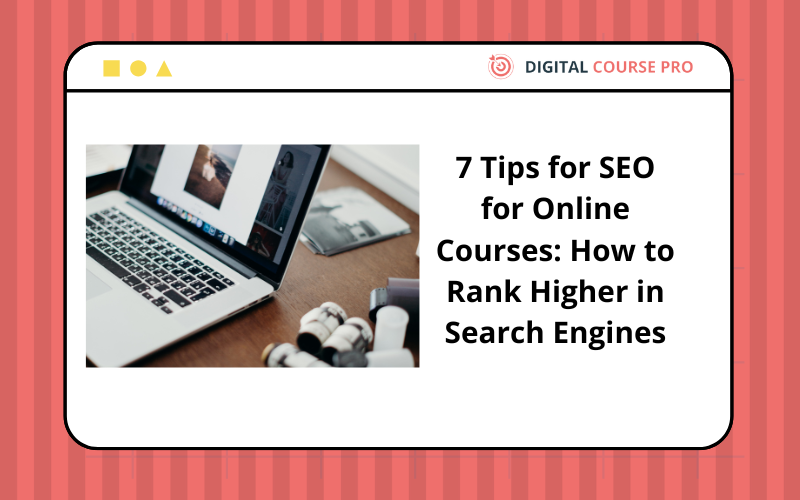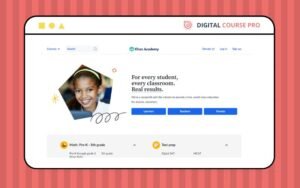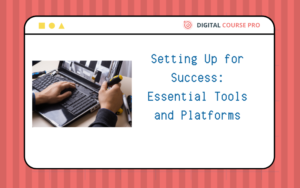SEO for online courses: How to rank higher in search engines is a crucial strategy for course creators aiming to attract more students and boost their visibility. Effective search engine optimization (SEO) can significantly increase your course’s reach and enrollment rates by making it easier for potential students to find you online. In this detailed guide, we’ll cover seven essential tips to help you optimize your online course for search engines and achieve higher rankings.

1. Conduct Thorough Keyword Research
Keyword research is the foundation of any successful SEO strategy. Start by identifying the terms and phrases that your target audience is likely to use when searching for courses in your niche. Tools like Google Keyword Planner, Ahrefs, and SEMrush can help you find relevant keywords with high search volumes and low competition.
Steps to Follow:
- Identify Core Keywords: Focus on keywords that directly relate to your course content.
- Long-Tail Keywords: Use longer, more specific phrases that potential students might search for, such as “beginner guitar lessons online” instead of just “guitar lessons.”
- Competitor Analysis: Analyze the keywords that competitors are ranking for to find gaps and opportunities.
2. Optimize Your Course Title and Description
Your course title and description are critical for both search engines and potential students. Ensure they are compelling and include your primary keywords naturally.
Tips:
- Course Title: Include the main keyword early in the title. For example, “Master SEO: A Comprehensive Guide to Search Engine Optimization.”
- Course Description: Write a detailed description that explains the benefits and unique features of your course, incorporating relevant keywords throughout.
3. Create High-Quality, Engaging Content
Search engines prioritize content that is valuable, informative, and engaging. High-quality content not only helps with SEO but also enhances the learning experience for your students.
Strategies:
- In-Depth Modules: Break your course into comprehensive modules that cover each topic thoroughly.
- Multimedia Elements: Use videos, infographics, quizzes, and interactive elements to make the content more engaging.
- Regular Updates: Keep your content current and relevant by updating it regularly based on feedback and new developments in your field.
4. Optimize for On-Page SEO
On-page SEO involves optimizing the content and HTML elements of your course pages. This includes headings, meta tags, URLs, and internal links.
Key Elements:
- Headings: Use H1, H2, and H3 tags to structure your content. Include keywords in your headings where appropriate.
- Meta Tags: Write compelling meta titles and descriptions for each page, incorporating your primary keywords.
- URLs: Use clean, descriptive URLs that include your keywords. For example, “yourwebsite.com/seo-online-course” instead of “yourwebsite.com/course12345.”
- Internal Links: Link to other relevant pages within your course site to improve navigation and distribute link equity.
5. Build Backlinks
Backlinks, or inbound links from other websites, are a significant factor in search engine rankings. They signal to search engines that your content is credible and valuable.
Methods:
- Guest Blogging: Write articles for other reputable websites in your niche and include links back to your course.
- Collaborations: Partner with influencers or other educators to promote your course and gain backlinks.
- Resource Pages: Get your course listed on resource pages or directories related to your field.
6. Utilize Social Media and Online Communities
Promoting your course on social media and online communities can drive traffic and generate backlinks, improving your SEO.
Actions:
- Social Sharing: Share your course content on platforms like Facebook, LinkedIn, Twitter, and Instagram. Encourage your followers to share it as well.
- Online Forums: Participate in relevant forums and online communities, such as Reddit and Quora, where you can provide value and include links to your course.
- Engage with Your Audience: Respond to comments and questions, and engage in discussions to build a loyal following and drive traffic to your course.
7. Monitor and Analyze Your SEO Performance
Regularly monitoring your SEO performance helps you understand what’s working and where you need to improve. Use analytics tools to track your rankings, traffic, and conversions.
Tools:
- Google Analytics: Monitor your website traffic, user behavior, and conversion rates.
- Google Search Console: Track your search performance, including keyword rankings and click-through rates.
- SEO Tools: Use tools like Ahrefs, SEMrush, or Moz to analyze your backlinks, keyword rankings, and overall SEO health.
Conclusion
SEO for online courses: How to rank higher in search engines is an essential aspect of building a successful online education business. By conducting thorough keyword research, optimizing your course title and description, creating high-quality content, focusing on on-page SEO, building backlinks, utilizing social media, and continuously monitoring your performance, you can improve your search engine rankings and attract more students.
If you’re looking to discover the secrets of a thriving online course business and gain financial independence, be sure to check out our detailed guide on How to Make $10,000 a Month with an Online Course Business. This blog post is filled with practical strategies, expert advice, and actionable tips designed to help you transform your passion into a lucrative endeavor. Whether you’re a beginner or aiming to expand your current courses, our all-inclusive guide offers the tools and insights you need to achieve your income targets. Visit our blog today and embark on your path to financial success!





